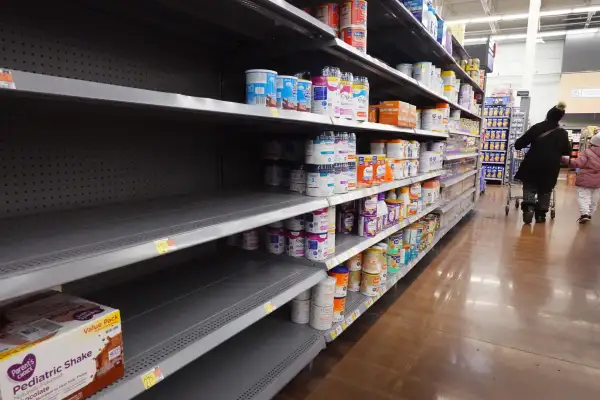Baby Formula Shortage: Why Target, Walgreens, Walmart and Other Stores Are Restricting Purchases

Major retailers like Target and Walgreens are limiting Americans' purchases of baby formula amid an ongoing shortage.
As of April 3, 31% of the most popular baby formula products were out of stock, according to data from product research firm Datasembly, which analyzed some 11,000 stores across the United States.
The numbers were worse in a handful of states. Datasembly found Connecticut, Delaware, Montana, New Jersey, Rhode Island, Texas and Washington all faced severe shortages in early April, leaving more than 40% of formula out of stock. In three cities — Des Moines, Minneapolis and San Antonio — out-of-stock rates for baby formula exceeded 50%.
The shortage follows a February recall of certain Similac, Alimentum and EleCare powdered formulas produced by Abbott Nutrition after four consumer complaints about possible bacterial contamination. The recall was voluntary; Abbott has said that none of the products it has distributed has tested positive for the bacteria in the complaints.
Ongoing supply chain issues are making it more difficult for producers to replace recalled products, which is contributing to the shortages around the country.
The recalled formula is no longer on store shelves, but if you think you previously purchased some, you can check the product lot number on Abbott’s website. For more information, read the Centers for Disease Control and Prevention's webpage about the Abbott formula products affected by the recalls.
Is baby formula more expensive now?
Datasembly found that formula prices have remained relatively steady despite the growing shortages. The average price of all baby formula products it tracks in January was $24.37, and at that time, just 3.3% of products were out of stock. In March, when the frequency of out-of-stock issues jumped up to nearly 30%, the average price inched up just slightly to $26.21.
That’s not to say that rising prices aren’t impacting parents and caregivers. A record-high rate of inflation — recently pegged at 8.5% on an annual basis — means that money simply doesn’t stretch as far as it did last year. The latest data from the Bureau of Labor Statistics shows that the price of baby food jumped nearly 11% between March 2021 and March 2022.
Baby formula is an essential product for millions of families. According to CDC data, just 25.6% of babies born in 2017 in the U.S. were exclusively breastfed through six months of age.
Citing the Infant Nutrition Council of America, CBS News reported this week that manufacturers are ramping up production to cope with the formula shortage. The council advised parents to keep a 10-day to two-week supply of formula available at home. It cautioned against stockpiling further and recommended that parents only purchase formula from reputable retailers or directly from the manufacturer, according to CBS News.
"Our hope is that as production ramps up, that later this spring it should be easier for families across the country," USA Today reported Brian Dittmeier, the senior director of public policy for the National WIC Association, said on Instagram Live.
In the meantime, some retailers are rolling out baby formula rations.
Walgreens has implemented a limit of three formula products per transaction, both online and in store, citing “increased demand and various supplier challenges,” a Walgreens spokesperson told Money via email. Target is limiting some online baby formula purchases, as well.
Walmart confirmed to Money that it's restricting formula purchases to five per customer, per child, per day in most stores and online in accordance with a request from the U.S. Food and Drug Administration.
CVS Health and Kroger reportedly have also established purchase limits on baby formula.
The American Academy of Pediatrics warns against watering down baby formula to save money and make it last longer. If you are unable to find your baby’s regular formula, the CDC advises contacting your baby’s health care provider for recommendations.
More from Money:
Inflation Soars to Highest Rate Since 1981 After Huge Spike in Gas Prices
Gas Prices Finally Drop Below $4 in Most States
How to Claim the Expanded Child Tax Credit on Your Taxes This Year

